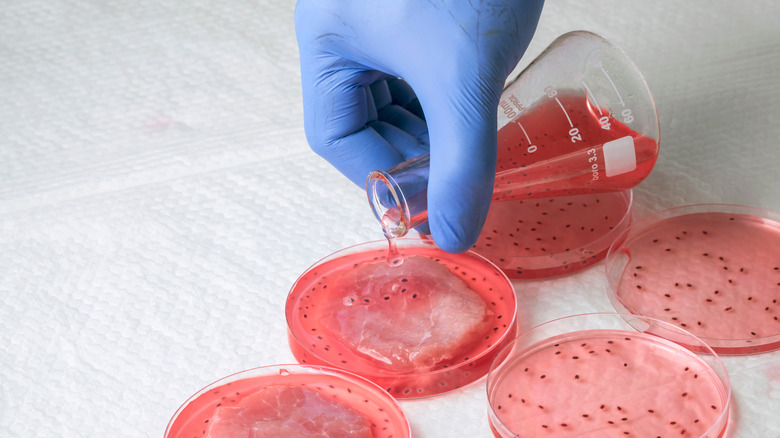The Cultivated Meat Industry Just Expanded To Include A New Variety
To say cultivated meat is a recent phenomenon is an understatement. The biotechnology to produce it didn't exist prior to 2013, according to the Good Food Institute. And until Singapore approved its use in late 2020, it wasn't commercially available anywhere in the world. Cultivated meat has still yet to be approved or made commercially available in the U.S., Reuters notes, although that status could change soon.
So, what is cultivated meat? Basically, per the Good Food Institute, it's real animal meat developed and produced in laboratory bioreactors from animal stem cell cultures. But instead of being fed oats or hay, the cell cultures are nourished by oxygen and essential nutrients. The potential for this new technology is pretty obvious. Not only does cultivated meat remove the need for slaughtering livestock, it's also safer — reducing the possibilities of harmful pathogens like salmonella — and environmentally friendly. Greenhouse gases are limited, for instance, as are other pollutants.
Naturally, given the potential for this ethical meat source — Mosa Meat claims it can harvest 80,000 burgers from a single cow's cell culture — many companies are investing in the technology. Israel has been one of the countries in the vanguard. The Times of Israel reported earlier this year that a cultivated meat consortium had been formed, which included almost 25 companies and academic institutions, and over $500 million in investments were committed to Israeli cultivated meat projects.
Israel-based companies announce cultivated meat breakthroughs
Israel-based cultivated meat (aka cultured meat) companies are already making big news. Future Meat Technologies recently announced via PR Newswire that it has produced the first cultivated lamb. The company explained it had been working to achieve the breakthrough for two years, using cells sourced from Awassi sheep. The challenge was cultivating lamb meat that tasted like actual lamb, and was not genetically modified.
"In passing this milestone, Future Meat reinforces its position as a leader and pioneer in the cultivated meat industry and shows again the limitless potential of how innovation can drive sustainable solutions," said the company's CEO Nicole Johnson-Hoffman. "The key learnings will be leveraged as we work to produce other meats, including beef and pork." Future Meat's ambitious future plans include a U.S.-based production facility, which according to FoodNavigator-USA, could happen as soon as 2022 (if approved). The expectation is a U.S. facility could appreciably outpace the company's current facility in Rehovot, Israel, which can generate over 1,000 pounds of cultivated meat daily.
Rehovot is apparently a cultivated meat hotbed, since Steakholder Foods, which also has facilities there, recently announced via press release that it's now able to develop cultivated pork products, like ham and bacon, using 3D-bioprinting technology. Theirs is not the first cultivated pork, it should be pointed out. In fact, just two weeks ago, per Business Wire, the American owned Novel Farms announced it had pioneered cultivated meat marbled pork loin.

